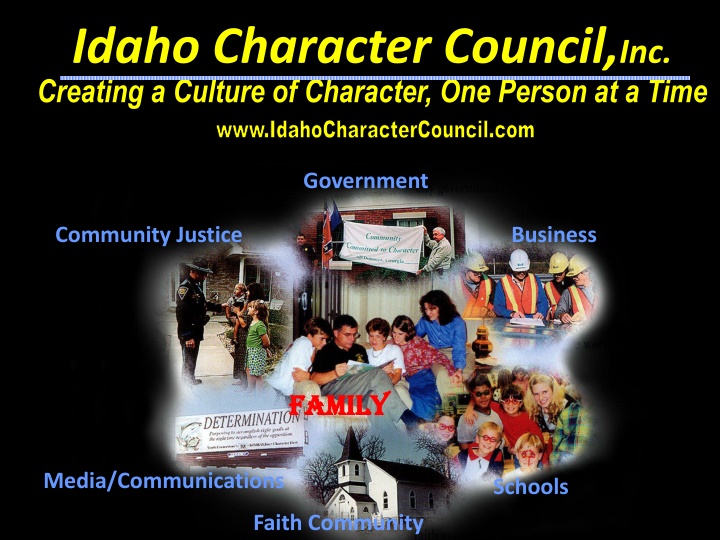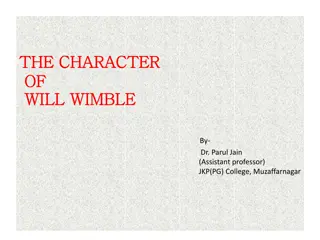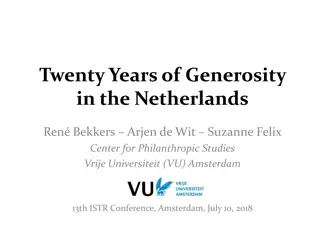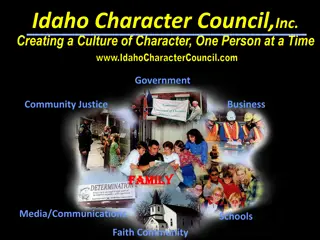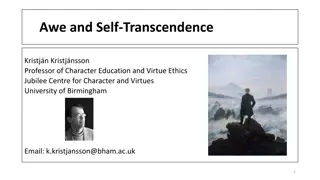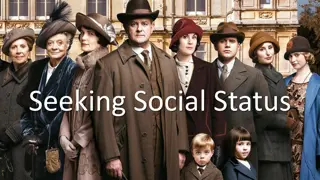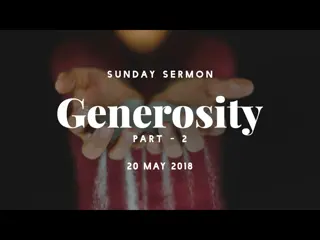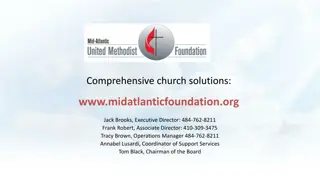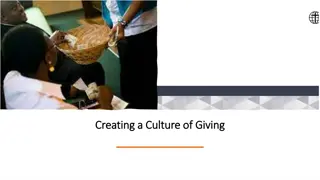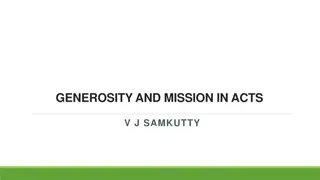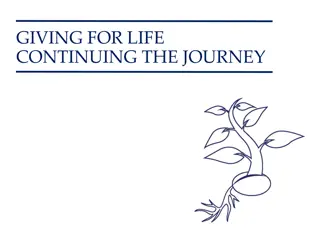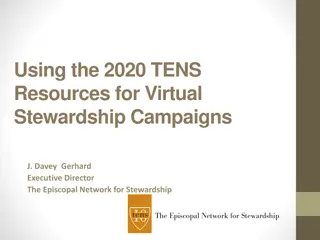Cultivating Generosity and Good Character in the Home
Explore the value of generosity and its impact on building a culture of character at home through thoughtful resource management, prioritizing family time, expressing gratitude, and serving the community. Embrace generosity as a way to nurture unity, love, and selflessness within the family unit.
Download Presentation

Please find below an Image/Link to download the presentation.
The content on the website is provided AS IS for your information and personal use only. It may not be sold, licensed, or shared on other websites without obtaining consent from the author.If you encounter any issues during the download, it is possible that the publisher has removed the file from their server.
You are allowed to download the files provided on this website for personal or commercial use, subject to the condition that they are used lawfully. All files are the property of their respective owners.
The content on the website is provided AS IS for your information and personal use only. It may not be sold, licensed, or shared on other websites without obtaining consent from the author.
E N D
Presentation Transcript
Idaho Character Council,Inc. Creating a Culture of Character, One Person at a Time www.IdahoCharacterCouncil.com Government Community Justice Business FAMILY FAMILY Media/Communications Schools Faith Community
Generosity Generosity vs. Stinginess Carefully managing my resources so I can freely give to those in need.
Generosity: A feel for others that comes out of your pocketbook. Generosity is not just free advice, it s profitable advice. Some think they are being generous if they give a person the time of day. You re more generous to give a dime a day.
Generosity in the home is a necessity for a home that is unified, and loving. There are certain things that are a must dealing with generosity in the home: 1) Be careful from spending money on things that would not benefit the whole family. This shows stinginess and selfishness, and teaches against good character. 2) Give up personal free time in order to spend quality time with the family. This states that the family is more important than the other things in your life, demonstrating good character.
3) Give thanks to those that give to you. Reward the wife for the dinner with a gentle thanks and a kiss. Reward the children for obedience with special time with you. Reward the dog for obedience with a bone. All will feel special and excited about being generous again. 4) As a family, pick something to do that would benefit the community, church, or another family that is in need. Get input from the whole family and all give to the need from their own resources.
He who gives only when asked, has waited too long. Generosity gives before it is reminded, and never seeks return. Generosity seeks for things to give too, and never leaves empty handed, for he always has the blessing of giving.
Example: A mother with four pieces of pie for five people will announce she is just not hungry and watch her children and husband eat the pie. Where is her reward? What other character qualities do you see here?
Anybody can be generous: The Lord loveth a cheerful giver, he also accepteth from a grouch because it s the only way he can learn that it s rewarding to give. Blessings come after the sacrifice. If your looking for blessings, give what you have away, and let the Lord give to you what you need.
Be generous with praise: Be generous with praise when your children display good character. Tell the cashier thanks when she loads up your bag. Let the officer know that you appreciate him doing his job when you are pulled over.
We must take an interest in generosity. Without interest, there is no investment. Without investment there is no future. If we want a future for our children, we must invest in their lives in many ways. And we must make a sacrifice to do so. This is a character quality of generosity.
There are many needs in the United States that are going unmet because we have wasted our resources on things that didn t matter. It s hard to care for others and give to them when we are broke and depressed because of something that we have done to ourselves. We make the bed, now we must sleep in it. In order for us to help others, we must be conservative with our own wants and desires. If we are careful with our resources then we will have enough to give something.
It used to be that the church was the generous community. If there was a need, they took up a collection and met the need. The stats now show that only 7-10 percent of the people that go to church tithe to the work that the church is doing. Churches are to be the spiritual organization that helps the poor, feeds the hungry, and clothes the naked. But now the church congregations have spent more than they have and can t afford to give a tenth to God s work. They are also now selfish and have lost their ability to be generous. Their hearts are good, their resources are gone.
How can we practice generosity as a community? G-Gain resources to help the ones in need. I-Investigate the real needs in the community. V-Value the people more than the money. E-Evaluate the situation to see if it needs attention. (Don t let the investment go to waste.) Whatever you do, do it because it s right, and don t be attached to the results.
Generosity is a necessity for life: In stories of survivors of the Nazi death camps, an attitude of determined giving was one of the things that distinguished the survivors from those who perished. If a prisoner was on the verge of starvation, but he had a crust of bread or a scrap of a potato that he could share with his comrade in suffering, he was psychologically and spiritually capable of surviving. A survivor of Treblinka described it this way: In our group we shared everything, and the moment one of the group ate something without sharing it, we knew it was the beginning of the end for him.
Generosity is a character quality that is very noticeable. Two little boys were given chocolates by their grandfather. The first took the chocolates and ran to his bedroom, tore into it and stuffed the candies into his mouth. The other boy unwrapped the chocolates in front of his grandfather and looked carefully through the candy. He then held the candy up to his grandfather and said, Thank you for the candy. Would you like to choose your favorite first? Which boy do you think will the grandfather want to give to in the future?
William Colgate believed in giving all that he had to meet the needs of people through the church. At the end of his life, 100% of his yearly income was given away to others that had needs. Two hundred years later, we still brush with his toothpaste, and wash with his soap, and they still make millions to give to the needy.
Henry Crowell, founder of Quaker Oats Company gives more than 60% of his income to help others through the church. He states, you can t be more generous than God. J.L. Kraft from Kraft cheese, gave 25% of all he made for good Christian causes. And contributes this to the success of his company. Generosity will always pay you back in some way.
Group As a group, think of ways that you can give to others in this season. Think of different ways of giving to truly meet the real needs that are in the community. Shelter, food, clothes, finance, time, or just a friend to talk to. Discuss different new ideas in the groups.
Next Breakfast of Champions: Mark Your Calendars! Thursday, January 13, 2005 Job Service on Ironwood Every 2nd Thursday of each month, 7:00am-8:00am, Everyone s Free!
